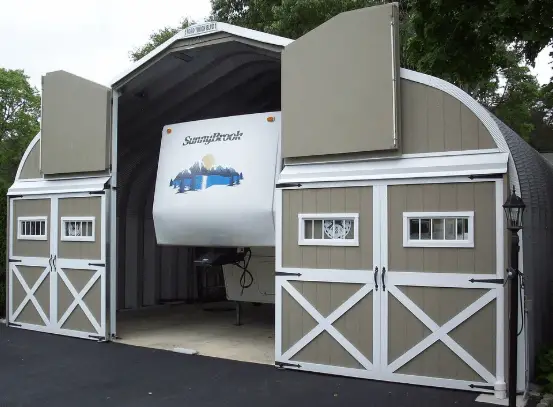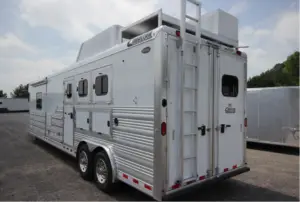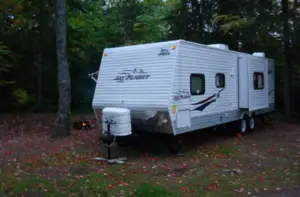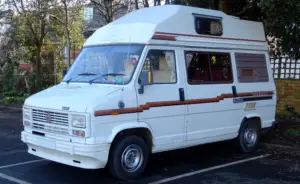Looking for the perfect place to store your RV but can’t find one?
Well, the best and most effective place to store a recreational vehicle is none other than your own home. However, there are some tips and tricks to effectively store your RV at home so that there are no infestations or other problems.
This question must be circulating in your mind right now. Well, I’d say no need to worry anymore because that’s precisely what I’m here to let you know.
In this article, I will talk about the best tips and tricks for storing your RV at home.
So, if you’re looking to keep your camper safe and sound right in your close view, make sure you give this entire article a thorough read.
Storing RV at Home
Well, if you’ve just recently bought a camper trailer or a motorhome RV or you’re thinking of switching storage spaces, you might be wondering, why store an RV at home? It’s effortless.
If you invest in an outdoor storage facility or a rented garage space, you’re going to spend a heaping amount of money.
But, if you’re thinking of storing your RV at home, you only would need to spend money on maintenance and renovation, saving a lot of cash.
Another great reason is that you’d be able to save your RV from sun rays in the summer and the unforgiving cold snow in the winter that will cause damage to the RV by storing the vehicle at home.
So, the ideal decision to make is to store your RV at home.
TIPS AND TRICKS FOR STORING RV AT HOME
What do you need to know to store and maintain your RV at home effectively?
To answer this and many other burning questions about RV home storage, I’ve made a list of the best tips and tricks you need to know as a camper owner who wants to store their vehicle at home.
Let’s take a look at these tips individually.
1. Allow breathability and air flow
Moisture could be a huge problem for your RV. If the inside of your RV traps moisture within, it could result in the RV developing mold and mildew. Nasty fungal smells, which are not something you’d want to see when you take your motorhome out of your garage.
The trick to deal with this is maintaining a proper airflow channel so that the temperature of the outside and the inside of the RV remains significantly similar.
You can accomplish this by keeping the trailer’s rooftop vents or camper open so that the RV can breathe normally.
There are also specialized RV covers that come with breathable materials providing maximum airflow.
You can use these covers if you want to ensure the outside of the RV remains safe and protected while the inside doesn’t allow any moisture buildup. This is a great trick and will surely work to keep your RV dry and safe.
2. Clean thoroughly before storage
Would it be cool if you took the covers off of the RV and saw it covered in dust and debris?
No.
That’s exactly what I thought. If you want to keep your RV clean and fresh when you take it out in the open on your next family and friends camping session, it’s best if you clean it up before storage.
First off, you’re going to want to clean the exterior. Make sure you get the RV waxed and washed properly.
All the windows, rubber and silicon seams, and crevices need to be properly cleaned if you want to avoid any breakage or tearing after a while.
Now, it’s time to clean the interior of the RV. Depending upon how lavish your vehicle is, you’re going to want to thoroughly clean the countertop, sleeping facilities, bathroom, and all the floor of the RV so that the interior doesn’t look or smell bad when you take the camper out for a ride in the spring.
3. Make RV infestation proof
Unfortunately, like homes, motorhomes or RVs are prone to infestations as well. Whether it’s a rodent or a bug infestation, it is going to be a problem. Typically, you might think seeing a single ant or termite isn’t a big deal. But that’s not the case at all.
Even a single termite could be an alarming sign. Especially if you’re about to store your RV for quite a while, any bug or termite or even rodent infestation needs to be dealt with, or else when you open up the vehicle to go for a ride, you’re going to see chewed up plumbing pipes and messed up wooden furniture.
You can take the RV to a specialist infestation removal company, or you can take matters into your hand and get an insecticide or pesticide spray bottle and make sure that you get all the nooks and crannies sprayed. Hence, no infestations are even remotely possible.
4. Keep a dim light ON
Under normal circumstances, you would choose to turn off all the lights within your RV before storing it at home. You might do this to save battery or simply because it seems like the right thing. Well, the ideal thing to do would be to place a light inside your recreational vehicle.
If you’re thinking of storing your RV at home, a great tip for you would be to keep a single light on within your RV. This will tackle the moisture inside the vehicle if it gets in somehow.
Since light acts upon moisture to remove it, the inside of your camper won’t get mold or a bad smell. Otherwise, mold and mildew might make their way into the interior of your RV.
5. Have all possible Security
First of all, the decision to store your recreational vehicle at home instead of storing it outside or in a rented garage is already very much safer. But there are still some security concerns that need to be addressed before storing your camper in your garage.
Make sure that the garage door is tightly closed if it is manual, and if it is automatic, you have the key on yourself at all times.
This is because if the door isn’t securely locked at night, it could result in a break-in, and the safety of your RV can be compromised.
Another crucial step or tip that I’d like to give you is to use an alarm and locking mechanism for your RV storage. You’ve spent thousands of dollars on your vehicle, a few more to ensure protection and safety won’t cause any harm.
6. Stop battery parasitic loads
The most important thing to remember when you’re storing your RV at home is turning the battery off and closing all RV’s electrical connections before storage. The power conservation will prove beneficial to you in the long run.
You should turn off the power inside the RV, so the battery doesn’t get drained, and when you take the RV out for a ride, the battery isn’t dead just because it wasn’t properly conserved.
If you’re storing the RV in winters, there are also chances of battery freezing. This won’t happen if you’re got a fully charged battery instead of a drained one.
So, in all circumstances, the best thing to do for you would be to cut off the electrical connections and battery usage within your RV.
7. Cut off propane
Not all campers and RVs come with built-in kitchen counters. Some only have sleeping facilities and bathrooms within them. But, if your RV comes with an included kitchen and gas connection, the safety and protection of the RV and the people around it become more of a concern.
If you forgot to close the propane when you’re done with cooking or you aren’t aware of a potential gas leak within the RV, any exposure to fire can cause an explosion or fire hazard, which can endanger the lives of the people that might be residing in the house where the RV is parked.
So, the best tip you need to know about is cutting the gas before storing your RV.
Just turning off the propane isn’t the solution. Make sure you cut the propane, so any potential risks of gas leaks are reduced to none. This will keep your vehicle and the people living around it safe and sound.
8. Protect the tires
The tires are the most likely to give out when an RV is in a store position inside your garage. There are a few adjustments you can make to keep your tires from giving out and bursting.
Make sure you remove excess weight from the RV, so the tires don’t need to carry more than usual weight for a long period of storage time.
Fill the tires before you store the vehicle so when you take it out for an outdoor adventure, the tires don’t give up on you.
Keep the RV at a cool and calm temperature so that the tires don’t get too warm in the summer or so cold that they freeze in the wintertime.
Ensure you clean the tires with soap and water thoroughly before storing the vehicle to avoid any cracks or dirt marks.
9. Remove all eatables
RVs are known as motorhomes because of their similarity to a home-like structure with all the necessities you’d require to live normally. Well, one of those necessities is a fridge.
- When you’re going to store your RV in your home garage, make sure you remove all the eatables and food from your fridge and RV in general.
- Afterward, clean the fridge and keep the door open for ventilation.
That’s not it, however. Make sure that you remove all essentials as well.
If you’re carrying a sleeping pillow or a favorite blanket, glasses, or anything that might be essential for your daily life and might cause you to open and close the RV again and again in the storage space so that once the RV is stored, it only be open for maintenance and cleaning or for taking in the right time.
10. Periodically check the RV
Now, despite making all these preparations and using all these tricks, any unfortunate problem might make its way to your RV by surprise. That’s why you need to know how to deal with the problem and when to do so.
It will be ideal if a problem with moisture trapping or battery drainage is encountered at their initial stages instead of when the damage has been done completely.
So, that’s why the best tip I’d give you for storing your RV at home safely and soundly would be to keep checking on it. Maintenance is vital, and you don’t need to take the RV to the mechanic all the time for this.
All you need to do is periodically check the RV stored in your garage. From the tires to the windows and the interior, schedule thorough checks for your RV if you’ve stored it inside your garage at home to ensure perfect health.
In Summary
Owning an RV is a big responsibility even though people might think it’s just like a huge car that’s great for camping. That’s why I believe every RV owner needs to know about these tips and tricks to make sure their recreational vehicle remains in tip-top shape.
The cold winter weather and the hot summertime are both known to have incredibly negative effects on the exterior and interior of an RV. This can cost up to thousands of dollars to repair. That’s why I’ve created a list of all the tips and tricks you need to know for storing your RV at home.
If you act upon all these steps and methods, I assure you, when you turn your RV on for your next vacation, you’re going to have nothing but smiles when it turns on and runs as smooth as butter. I hope you have a great outdoor adventure with your camper!





